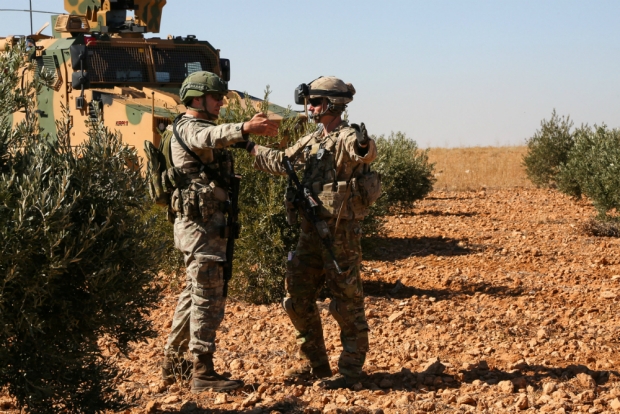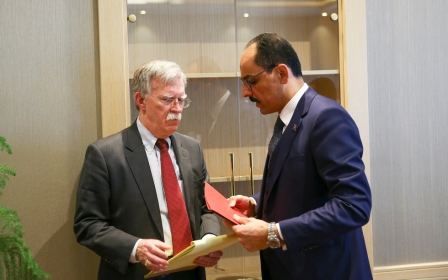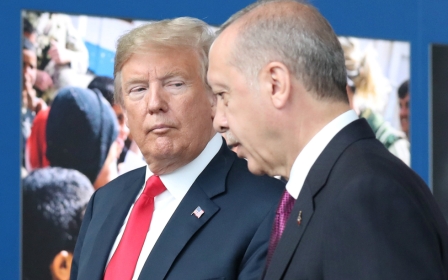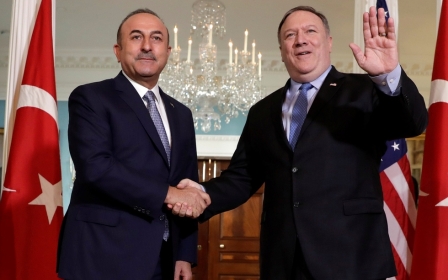EXCLUSIVE: The US five-point 'non-paper' for Syria delivered by Bolton to Turkey
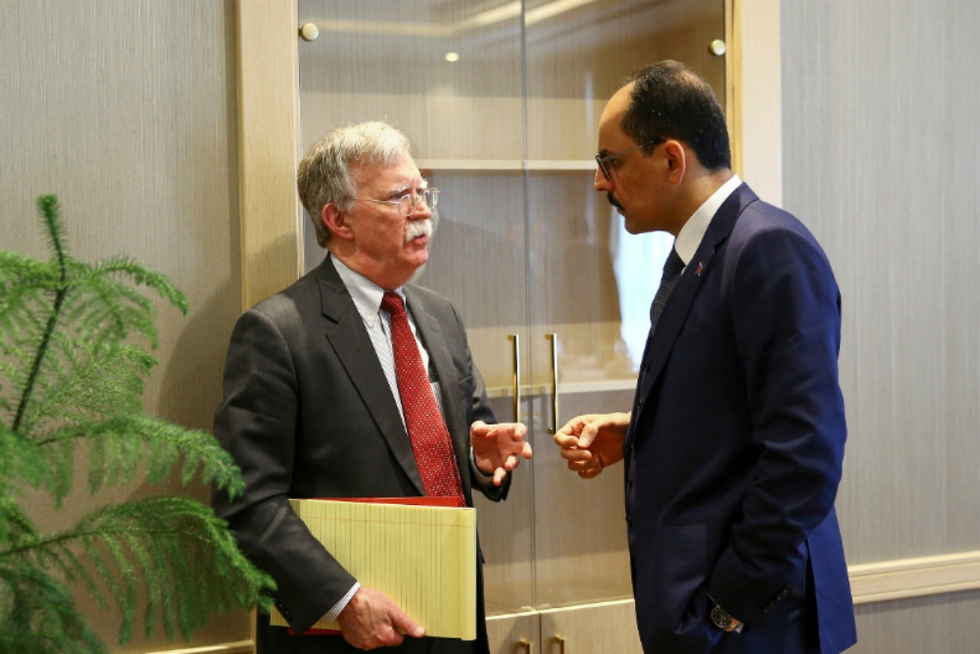
ISTANBUL, Turkey - US diplomats and military officials failed to present any specific details to their Turkish counterparts about Washington's plans to withdraw its forces from northern Syria during National Security Adviser John Bolton's visit to Ankara on Tuesday, Middle East Eye has learned.
Turkish officials had been expecting Bolton and his entourage to bring with them draft plans for the withdrawal of about 2,000 soldiers deployed as part of the US-led campaign against Islamic State (IS) militants following US President Donald Trump's announcement last month of his intention to pull them out of Syria.
But the US delegation instead delivered what Turkish officials described as a "non-paper", an unofficial diplomatic note listing a country's position on certain matters which is open for discussion.
The five-point document proposed a negotiated solution addressing Turkish security concerns about the YPG, the Syrian Kurdish militia which Ankara accuses of links to the banned Kurdistan Workers Party (PKK) but which has played a leading role as a US ally in the ground campaign against IS.
It also reiterated that the US withdrawal would be "deliberate and orderly", but US officials did not present any operational information or discuss a timetable or post-pullout planning, a Turkish official told MEE, speaking on condition of anonymity due to government protocol.
Those in attendance with Bolton during the two-hour meeting at the presidential palace included General Joseph Dunford, the chairman of the Joint Chiefs of Staff, the highest-ranking officer in the US military and the principal military adviser to Trump and senior officials, and James Jeffrey, the US special envoy to the anti-IS coalition.
Turkish officials attending the talks were led by Ibrahim Kalin, the spokesperson for the Turkish presidency.
Concerns for YPG
Their main message, the Turkish official said, was to stress their concerns for the safety of YPG fighters following the US withdrawal.
Turkey already has forces on the ground in rebel-held areas west of the Euphrates river in northern Syria, where it considers Kurdish militias a security threat to its southern border. It has threatened to launch operations across the Euphrates into areas currently under the control of the YPG and its allies.
A senior Trump administration official briefed on objectives outlined at the meeting, speaking to MEE, confirmed that five conditions were delivered to Turkish officials.
Firstly, the US reiterated that the withdrawal of its anti-IS forces in northeastern Syria would happen in a deliberate, orderly and strong manner.
The United States opposes any mistreatment of opposition forces who fought with the US
- Senior Trump administration official
Secondly, the US, in the non-paper, committed itself to defeating the remnants of IS and continuing to damage IS targets throughout the withdrawal period.
While IS fighters have been ousted from the major towns and cities they once held, fighting between US-backed forces and IS militants has continued in the Middle Euphrates River Valley with the US continuing to launch regular air strikes in support of allied forces.
"As the president has stated, the US will maintain whatever capability is necessary for operations needed to prevent IS's resurgence," the administration official said.
Thirdly, the US declared that it wants a negotiated solution to Turkish security concerns with regard to the YPG.
The official said: "The US will cooperate with Turkey and other coalition members on continuing [anti-IS] operations and de-conflicting the airspace over northeast Syria. The United States opposes any mistreatment of opposition forces who fought with the US against IS."
Withdrawal of Iran-backed forces
Fourthly, the official also made clear that the US would pursue the withdrawal of Iranian-backed forces from Syria and a political solution in Syria.
Syrian President Bashar al-Assad has drawn heavily on Iranian military support, including units of the Revolutionary Guards Corps and Iran-backed Hezbollah militia fighters, during the country's eight-year civil war.
“The US is not withdrawing from the base at al-Tanf at this time,” the official said, referring to the only US military site in southern Syria that currently provides a refuge for some Free Syrian Army opposition forces and refugees.
Finally, the US made clear that the release of captured IS militants - described as "foreign terrorists" by the US official - held by the YPG-led Syrian Democratic Forces is "unacceptable". An appropriate disposition of those prisoners is a top priority, the official said.
SDF leaders threatened in recent weeks to release these prisoners because, they said, they were understaffed and due to the threat of possible Turkish attacks in the north.
A source with knowledge of the talks said Turkish officials, in the meeting in Ankara, agreed not to conduct military operations against YPG targets while US forces remained in Syria, but repeated Ankara’s position that the YPG is a terrorist organisation which Ankara had every right to expel from its borders.
But Turkish Foreign Minister Mevlut Cavusoglu told Turkey's NTV television on Thursday that it could still launch an offensive if the US delayed its withdrawal with "ridiculous excuses".
"We are determined on the field and at the table... We will decide on its timing and we will not receive permission from anyone," said Cavusoglu.
The source also said Bolton had inquired about the state of negotiations between Turkey and Russia over the post-US withdrawal. In response, Turkish officials declined to reveal the particulars of their diplomatic conversations.
120 days
Turkish officials expect that the withdrawal will take place in 120 days, and during this time, according to the source, US officials need to show some goodwill to satisfy Turkish concerns.
This is why Turkish officials urged their counterparts to uphold the already agreed Manbij roadmap and quickly remove YPG elements from Manbij and its military council accordingly. Otherwise, they said, Syrian government or allied Russian forces could take the control of the town.
Russian military police have already started to patrol the area near Manbij town, Russian state media reported on Wednesday.
Following the meeting at the presidential complex, Dunford separately met Turkish Defence Minister Hulusi Akar and his Turkish counterpart General Yasar Guler.
Both Turkish and American statements about the discussion between the military leaders specifically focused on the need to quickly implement the remaining components of the Manbij roadmap.
Murat Yesiltas, the director of security studies at the Ankara-based SETA thinktank, said Manbij could be the first area where progress towards a wider resolution could be made.
“There is an understanding between Turkey and Russia about Manbij as well,” he said.
There are other signs in the Turkish media suggesting that an agreement on Manbij is likely.
Proposed tomb move
Hasan Basri Yalcin, a columnist for the Turkish government-aligned Sabah newspaper, wrote on Sunday that Turkey should push for a military operation in which the historic Suleyman Shah tomb could be moved back to its original location near Manbij.
The tomb, which is considered as a Turkish enclave according to a treaty between Syria and Turkey, was moved from the eastern bank of the Euphrates river to the Turkish border near the Syrian city of Kobani in 2015.
The Trump administration, on the other hand, continued to send mixed signals about its withdrawal plans on Wednesday.
US Secretary of State Mike Pompeo reiterated that Trump’s decision was clear and that Turkish threats against Syrian Kurds would not stop the pull out.
Asked in Erbil if Turkish President Recep Tayyip Erdogan’s pushback on the protection of the Kurds puts the withdrawal at risk, Pompeo told reporters: “No. We’re having conversations with them even as we speak about how we will effectuate this in a way that protects our forces.
“It’s important that we do everything we can to make sure that those folks that fought with us are protected and Erdogan has made commitments, he understands that,” Pompeo added, according to Reuters.
"Turkish officials don’t want to do anything that can backfire and push Trump to reverse his decision to withdraw," Yesiltas said.
This article is available in French on Middle East Eye French edition.
New MEE newsletter: Jerusalem Dispatch
Sign up to get the latest insights and analysis on Israel-Palestine, alongside Turkey Unpacked and other MEE newsletters
Middle East Eye delivers independent and unrivalled coverage and analysis of the Middle East, North Africa and beyond. To learn more about republishing this content and the associated fees, please fill out this form. More about MEE can be found here.


